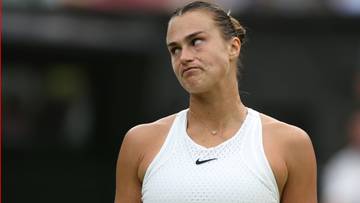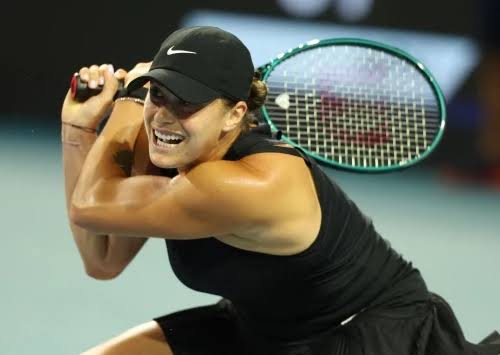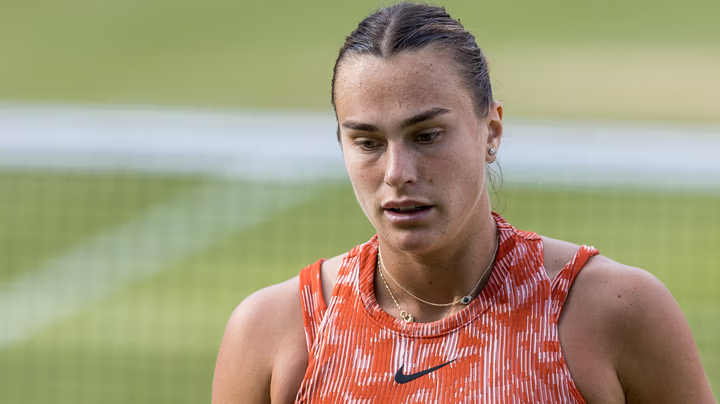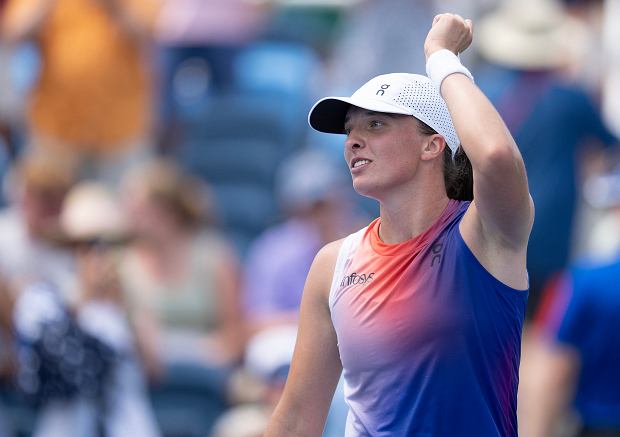Lawina fatalnych wieści dla Sabalenki. Kontuzja to dopiero początek. Będzie gorzej
Aryna Sabalenka wycofała się w poniedziałek – na zaledwie kilka godzin przed planowanym wyjściem na kort – z Wimbledonu. Białorusinka walczyła z czasem, aby zdążyć wyleczyć kontuzję, ale ostatecznie musiała się poddać. Jak się okazuje – to dopiero początek złych wiadomości dla tenisistki z Mińska. Rezygnacja ze startu w Londynie oznaczać będzie dla niej ogromne straty w rankingu WTA.
Tuż przed Wimbledonem Sabalenka wystąpiła w Berlinie. Już w swoim drugim meczu musiała jednak skreczować. Nabawiła się bowiem kontuzji barku, który uniemożliwił jej dalszą grę. W kolejnych dniach walczyła o powrót do zdrowia. Sprawa była jednak wyjątkowo trudna, bo jej uraz był nietypowy.
ZOBACZ TAKŻE: Szybkie zwycięstwo Coco Gauff w 1. rundzie Wimbledonu
- Myślę, że jestem drugą albo trzecią tenisistką, która kiedykolwiek uszkodziła sobie ten mięsień. Najbardziej denerwujące jest to, że mogę robić wszystko. Mogę trenować, mogę uderzać z głębi kortu. Problemem jest tylko serwis. To bardzo frustrujące. Nie czujesz się jak osoba kontuzjowana. Jeśli dacie mi jakieś ciężary, to będę je podnosić. Jednak jeśli każecie mi serwować, to będzie mnie bolało – mówiła Sabalenka na konferencji prasowej w Londynie.
Do ostatnich chwil Białorusinka walczyła o powrót do odpowiedniej dyspozycji. Ostatecznie przegrała jednak walkę z czasem i w poniedziałek, na kilka godzin przed planowanym wyjściem na kort, wycofała się z turnieju.
“Ze złamanym sercem muszę wam wszystkim powiedzieć, że nie będę mogła zagrać w Wimbledonie. Próbowałam wszystkiego, żeby się przygotować, ale niestety moje ramię nie współpracuje. Dzisiaj na treningach dałam z siebie wszystko, ale mój zespół wyjaśnił, że gra tylko pogorszy sprawę. Ten turniej wiele dla mnie znaczy i obiecuję, że za rok wrócę silniejsza niż kiedykolwiek” – napisała zawodniczka w mediach społecznościowych.
Kontuzja to dopiero początek złych wiadomości dla Sabalenki. Brak startu w Wimbledonie oznacza bowiem dla niej ogromną stratę punktów w rankingu WTA. W zeszłym roku doszła ona w Londynie do półfinału, przez co teraz zostanie jej odpisanych aż 780 punktów.
Jak przełoży się to na rywalizację z Igą Świątek i Coco Gauff? Bardzo dotkliwie. Niezależnie od wyników Polki, różnica pomiędzy dwiema zawodniczkami wyniesie co najmniej 4100 punktów. Im dalej zajdzie raszynianka, tym mocniej ucieknie w zestawieniu Białorusince. Pewne jest już także, że pozycję wiceliderki po Wimbledonie zachowa Gauff. Amerykance wystarczy przejść do trzeciej rundy (obecnie jest w drugiej), aby wypracować 1000 punktów przewagi nad Sabalenką.
Mało tego! Białorusinka może nawet spaść na czwarte miejsce. Aby tak się stało, londyński turniej musiałaby wygrać Jelena Rybakina. Nie jest to niemożliwe – Kazaszka triumfowała przecież na Wimbledonie w 2022 roku.
Aryna Sabalenka’s abrupt withdrawal from Wimbledon due to a shoulder injury has significant ramifications for her career and the WTA rankings. This essay delves into the implications of her absence, the nature of her injury, comparisons with her competitors like Iga Świątek and Coco Gauff, and the broader context of her recent performances and challenges.
Aryna Sabalenka, a prominent figure in women’s tennis, was forced to withdraw from Wimbledon just hours before her scheduled match due to a recurring shoulder injury. This injury not only dashed her hopes for this prestigious tournament but also has far-reaching consequences for her ranking in the Women’s Tennis Association (WTA).
The Nature of Sabalenka’s Injury
Sabalenka’s injury, a rare muscle strain in her shoulder, has severely limited her ability to serve effectively, a critical component of her game. Despite intensive efforts to recover in time for Wimbledon, including extensive rehabilitation and modified training, she ultimately had to concede defeat to her injury.
In her own words, “I can do everything else. I can hit groundstrokes, I can do weights. The problem is just the serve. It’s very frustrating. You don’t feel like you’re injured. If you give me some weights, I’ll lift them. But if you ask me to serve, it will hurt.”
Ramifications on WTA Rankings
The withdrawal from Wimbledon has dire consequences for Sabalenka’s WTA ranking. Last year, she reached the semifinals, earning 780 ranking points. With her absence this year, those points will be deducted, potentially dropping her in the rankings.
Currently ranked within the top three, Sabalenka faces the risk of slipping down to fourth place, especially if her competitors like Jelena Rybakina perform exceptionally well in Wimbledon. Rybakina, a previous Wimbledon champion, could potentially displace Sabalenka with a strong showing.
Moreover, Coco Gauff’s advancement to the third round would solidify her position as the second-ranked player post-Wimbledon, maintaining a significant lead over Sabalenka.
Comparison with Competitors
The withdrawal’s impact extends beyond rankings to competitive dynamics. Polish sensation Iga Świątek, currently leading the pack, stands to widen the gap between herself and Sabalenka by at least 4100 points, regardless of her performance at Wimbledon.
Coco Gauff, on the other hand, is poised to secure the second spot if she progresses to the third round, bolstering her position with a 1000-point lead over Sabalenka.
Career Trajectory and Future Prospects
Despite this setback, Sabalenka remains optimistic about her future. She expressed her disappointment on social media, promising to return stronger next year. Her determination and resilience in the face of adversity highlight her commitment to the sport and her aspirations for continued success.
Broader Implications for Women’s Tennis
Sabalenka’s injury underscores the physical toll of professional tennis and the unpredictability of sports careers. It serves as a reminder of the challenges athletes face in maintaining peak performance and managing injuries effectively amidst rigorous schedules.
Aryna Sabalenka’s withdrawal from Wimbledon due to a shoulder injury has profound implications for her career trajectory, WTA rankings, and competitive dynamics among top women tennis players. While she faces challenges in the immediate aftermath, her resolve and determination suggest that this setback will only fuel her drive to return stronger and reclaim her position among the elite in women’s tennis.
As the season progresses, all eyes will be on Sabalenka’s recovery journey and her comeback strategies, which will undoubtedly shape the narrative of women’s tennis in the coming months.






